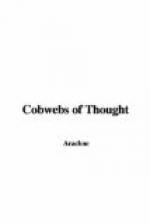II.
CONTRASTS.
CARLYLE, GEORGE ELIOT, MAZZINI, BROWNING,
All contrasts drawn between writers, and thinkers should have for aim the setting forth of some striking and fundamental difference in thought, and it would be hard to find anywhere a greater and a more vivid contrast than that between Carlyle and George Eliot. For George Eliot’s philosophy was centred in the well-being of the Race.
Carlyle’s was summed up in the worth of the Individual.
George Eliot teaches in prose and still more in poetry that Personality, with its hopes, loves, faiths, aspirations, must all be relinquished, and its agonies and pains endured, should Humanity gain by the sacrifice and the endurance.
She considers the Individual as part of collective humanity, and that he does not live for himself, he has no continuance of personal life, he has no permanence, except as a living influence on the Race. This is the Positivist creed, the Racial Creed.
Beyond the influence that it exerts, spiritual personality is doomed. It is not humanity in God but humanity in itself which is to exist from age to age, solely in the memory of succeeding generations.
“Oh may I join the Choir Invisible
Of those immortal dead, who live again
In minds made better by their presence.”
Permanence and continuance and immortality are in the race alone. George Eliot’s strong accentuation of the race is the Gospel of annihilation to the individual. Yet the most personal and imaginative of poets has treated this lofty altruism in his strange, sad, beautiful poem of “The Pilgrims,” with a fervour greater even than that of George Eliot.
Here are two stanzas:
“And ye shall die before your thrones
be won.
Yea, and the changed world and the liberal
sun
Shall move and shine without us and we
lie
Dead; but if she too move on earth and
live,
But if the old world with the old irons
rent,
Laugh and give thanks, shall we not be
content?
Nay we shall rather live, we shall not
die,
Life being so little and Death so good
to give.”
“Pass on then and pass by us, and let us be.
For what life think ye after life to see?
And if the world fare better will ye know?
And if men triumph, who shall seek you and say?”
“Enough of light is this for one life’s span.
That all men born are mortal, but not Man:
And we men bring death lives by night to sow,
That man may reap and eat and live by day.”
—SWINBURNE.
Turning from the moral grandeur of self-abnegation that fills the philosophy of humanity, we feel the contrast of strong human personality, which animates us with an inspiring sensation as we listen to the prophet of individualism.




